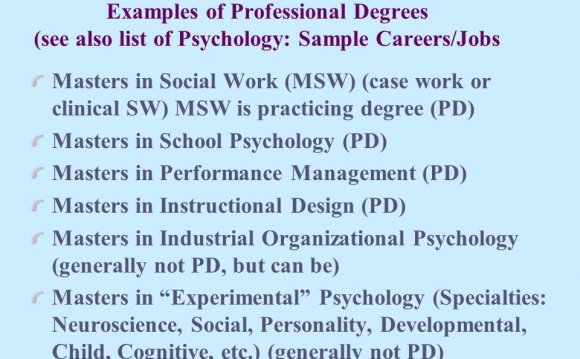
One motivating factor for being a psychologist is that over a quarter of psychologists are self-employed, which is four times the national average. Psychologists generally need a graduate level psychology degree to be successful. Medical school is required for many psychologists who specialize in clinical psychology or counseling, and a master's degree is minimum requirement for most educational facilities and organizations.
The work of psychologists is to examine human mental processes and how they affect behavior. Many psychologists are involved in research, where they explore the intellectual, physiological, emotional, or social facets of human conduct. Researchers hypothesize and then gather information; either by experiments performed in a lab or by dispensing tests, and then draw conclusions. Psychologists might also observe test subjects, study physiological effects of mental stimulation, or administer questionnaires and surveys as part of their research. Other psychologists provide health services at hospitals, schools, clinic, or private practices.
Psychologists not only collect data but find applications for it in almost every field, e.g. business, government, management, employee relations, law, and sports. Most psychologists have a firm grasp of general principles but specialize in one particular field where they help with training, counseling, or developing programs.
Types of Psychologists
- Clinical Psychologists
This is the largest area of practice. Clinical psychologists are generally employed at medical facilities like clinics or hospitals or group practices. Those who work at medical facilities might help patients deal with injuries or infirmities while others might help other people deal with emotional disorders or adjust to life changes. Many psychologists work at centers for physical rehabilitation where they work with patients with injuries, disabilities, strokes, or chronic problems. Still other psychologists might help people deal with trauma, such as the loss of a family member.
The work of clinical psychologists is varied. They spend a lot of their time in personal sessions with patients or administering tests. Aside from personal sessions, they may also involve patients in group therapy, family therapy, or develop and execute plans of action to help patients change behavior. Some work closely with other medical professionals to design treatment programs for specific issues. Others might work at institutions of higher learning where they train students or conduct research. Many work in programs designed to increase community health.
Because the work of clinical psychologists is so varied, many specialize in specific areas. Health psychologists help people maintain healthy lifestyles through counseling. They might help people quit smoking or maintain a healthy body weight. Neuropsychologists study the human brain’s physical processes. They often work closely with patients with head injuries or strokes to determine how injuries to different areas of the brain affect behavior and mental health. Geropsychologists study the effects of aging. These fields demonstrate how psychologists are finding more specific applications to specific demographics.
Clinical psychologists often work with physicians or pharmacologists to determine the best treatment and to discuss medication options as they are not qualified to dispense medications unless they’ve completed medical school. However, this may change. New Mexico has pioneered a program that allows clinical psychologists to get extra training to allow them to dispense medication, and other states may soon follow suit.
- Counselors
They use many methods including personal consultations and examinations to help people deal with everyday pressures and find ways to live happy, productive lives. They generally work at group practices, career or educational counseling centers, or hospitals.
- School Psychologists
These psychologists work to maximize students’ education and minimize behavioral problems at elementary or secondary schools or at the district level. They work with educators, administrators, and parents to deal with problems such as drug abuse or violence; improve learning through classroom techniques; help improve parenting; and find the best programs for disabled or gifted students. They may also work in assessing school programs, guidelines for dealing with behavioral problems, parent involvement, or other school programs.
- Industrial-Organizational Psychologists
They use their knowledge and training in the workplace. They have two goals: firstly to increase productivity for the company, and secondly to advance the quality of life of the workers. Often these two goals coincide. They often perform research about administration issues or effective advertising. Besides their research, they are often involved with people more directly, interviewing applicants, developing and running training programs, providing advice for employees, or analyzing organization. Often companies don’t employ in-house industrial psychologists and so they work as consultants.
- Developmental Psychologists
They study the changes in physiology, cognitive ability, and social interaction that occur throughout various life-stages. Many choose to specialize on a specific stage like early childhood, adolescence, or geriatrics. They might also look at the disabilities that occur in various stages, such as finding new ways to help the elderly remain autonomous and alert.
- Social Psychologists
These psychologists examine how individuals interface with society and trends in the society. The largest areas of work are group dynamics, nature of leadership, ways of thinking, and ways of perceiving the world. Social psychologists are helpful in a number of different fields including organizational management, marketing, and designing programs and systems.
- Research/Experimental Psychologists
They conduct research at centers, universities, corporations, non-profit organizations, or for the government. They look at patterns of behavior in humans or animals to learn about attention span, learning processes, effects of drugs, motivation, genetics, and neurology.
Share this Post
INTERESTING PSYCHOLOGY VIDEO













